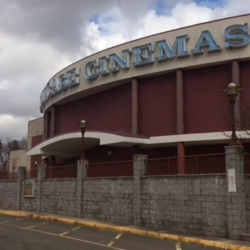Board members in East Windsor, Connecticut voted to approve an agreement for a casino development in their community. The Mashantucket Pequot and Mohegan tribes will own the casino in a joint venture.
The city of East Windsor is going to receive $3 million a year in property taxes, among other considerations. The total package is expected to amount to $5.5 million in gaming revenues for East Windsor, at least in its early years.
Near Showcase Cinemas off I-91
The yet-to-be-named casino is going to be located next to an closed movie theater, Showcase Cinemas, off I-91 in East Windsor. When it opens, the development will be the third brick-and-mortar casino in Connecticut.
The other two casinos, Foxwoods and Mohegan Sun, are owned by the Mashantucket Pequot and Mohegan tribes, respectively. The two Connecticut tribes have been rivals in the casino industry for the past 25 years, but they East Windsor casino is a joint venture.
MGM Springfield: 30 Miles Away
Both tribes hope to stave off a challenge by the MGM Springfield, which is located 30 miles down I-91 across the border in Massachusetts. The concept behind the satellite casino is to keep Hartford-area gamblers from driving across the border to MGM Springfield, which is much closer to Hartford than either Foxwoods or Mohegan Sun.
Over two dozens East Windsor residents spoke at the hearing. Some of those residents were against placing a casino in the community, whatever the financial benefits. The anti-casino speakers cited the social and personal costs of living near a casino.
Residents’ Concerns with the Casino
Other residents suggested the state legislature should throw open the bidding to more than one casino development. They believe outside operators to the Foxwoods/Mohegan Sun proposal would create competition, thus providing for a better deal for the community.
That was never a possibility, from the perspective of East Windor’s municipal leaders. Had the city’s leaders dragged their feet, the tribal gaming interests had a backup plan with the nearby community of Windsor Locks. East Windsor needed to approve the current plan or see $5.5 million a year go to a nearby community.
Selectman Jason Bowsza on Economic Development
Selectman Jason Bowsza noted that the casino will bring economic development to East Windor. Bowsza told the Hartford Courant, “It’s an opportunity for East Windsor to take a step in a different direction.”
The tribes are under pressure to get their development plan to the state legislature sooner rather than later. With citizens groups and other gaming interests pushing lawmakers to look at other options, the tribes need to move quickly. It is thought having an agreement with a local community should help Foxwoods and Mohegan Sun.
Over 2000 Slot Machines and 50-150 Gaming Tables
The plan for the East Windsor casino is a gaming space with approximately 2,000 slots, as well as 50 to 150 gaming tables. The gaming tables would include blackjack, roulette, baccarat, and a handful of other player favorites. A small poker room also would be built.
Construction would provide nearly a thousand temporary jobs, while the casino would provide hundreds of permanent jobs. The casino would generate more revenue for Foxwoods and Mohegan Sun, but the plan is more to retain a customer base than expand it.
Mohegan Sun is thought to have over $2 billion in debt, but it owns Mohegan Sun at Pocono Downs in Pennsylvania. Also, Mohegan Sun manages the Resorts Casino in Atlantic City, which has been a boon to Morris Bailey, the casino’s owner. Resorts Casino is known in the New Jersey online gambling industry as the partner of PokerStars. Plans to expand into New York State and Pennsylvania fell through in the past few years, as the licensing authorities passed over Mohegan Sun plans for other developers.
Foxwoods defaulted on debt in 2009 during the global recession, which caused Standard & Poor’s to downgrade their credit rating. The tribe had a gaming monopoly in Connecticut until 1992, when Mohegan Sun opened as a significant rival. In the 1990s and early 2000s, the tribes each borrowed heavily in order to expand operations in an escalating rivalry. The resulting debt meant both tribes struggled in the wake of the 2008 finance crisis.

